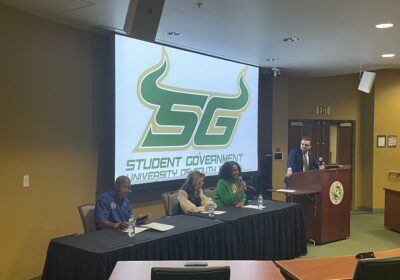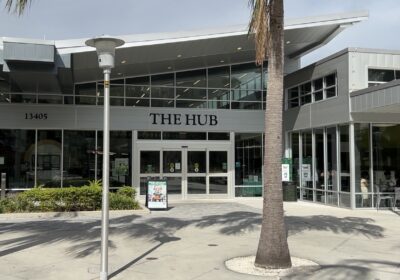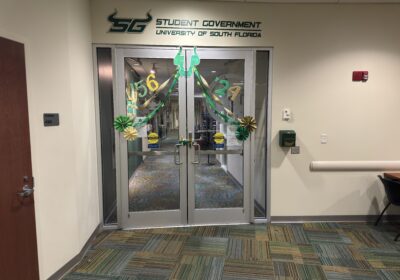Admissions slightly ‘de-emphasizes’ test scores for upcoming academic year

As the academic year unfolds, USF begins a new cycle of admissions for the upcoming class. Apart from dealing with the competitive aspect of recruiting, the university will also have to navigate the challenges and limitations set by the ongoing pandemic.
The novel coronavirus changed the course of the year in a span of a few months, and now, due to its magnitude and impact, it challenged high school seniors applying for college. With several test centers and embassies around the world closed, USF had to be flexible when planning to recruit students for the upcoming academic year.
In light of the test center’s closures, Vice President and Dean of Admissions Glen Besterfield said he doesn’t believe students will be testing as much as in previous years due to limitations set by COVID-19 and the challenge of finding open availability in test centers.
As a result, he said the Office of Admissions will be “slightly” de-emphasizing test scores in the overall student application while putting more emphasis on their curriculum, weighted GPA and academics.
“We’re de-emphasizing the test score a little bit, putting less emphasis on the test score and more on the curriculum, the weighted GPA and things like that. … We’ve adjusted accordingly to take into account that students will not be able to test as much,” Besterfield said.
After most test centers in the country shut down to mitigate the spread of COVID-19, several institutions across the country became “test optional,” which means applicants are not required to submit SAT or ACT scores for fall 2021 admissions.
Out of 2,330 bachelor’s degree-granting institutions recognized by the federal government, the National Center for Fair and Open Testing reported that more than 1,570 schools became test optional.
However, none of Florida’s state universities are among that list — including USF.
Alongside Wyoming, Florida is one of the few states that hasn’t lifted test score requirements for college admissions. While the issue has been brought to the Florida Board of Governors’ attention, no major decision has been made about it yet.
While applications are slightly down as a result of COVID-19, Besterfield said his biggest worry lies in the availability of open test centers across the country.
“We’re seeing some limited testing, some test cancellations,” Besterfield said. “Fortunately, a lot of our students, of course, come from the Pinellas, Hillsborough, Sarasota-Manatee, Polk, Pasco area. We haven’t seen many cancellations in this area, most of the cancellations are coming out of southeast Florida, which is what you would call a hot spot. So we are seeing test scores becoming a problem. I think we’ll be OK. We are adjusting accordingly.”
College Board — the company behind the SAT — reported 32 closed test centers across the state for the Sept. 26 SAT. The number grew in October, with about 53 test centers that had to shut down, including more than 20 across Miami-Dade and Broward counties.
Across the Hillsborough, Pinellas, Pasco, Polk and Sarasota-Manatee county areas, College Board reported four closures for Sept. 26 and more than 10 for the Oct. 3 SAT.
For the Nov. 7 SAT, the number significantly decreased to six test centers across the state as of Oct. 11. The test date is scheduled to proceed as planned, however, the number of available test centers is not final as they may close or make changes on short notice, including on test day, according to College Board’s website.
While USF aims toward meeting preeminent and national benchmarks, Besterfield said he expects the average SAT and ACT scores to decrease for the upcoming class.
“It’s going to affect our average … I think our average will come down this fall,” Besterfield said. “I’m not willing to speculate on what ‘s going to come down. You know, maybe things will change. But yes, definitely. We’re just going to see students not test as much.”
The 2020 freshman class, which includes incoming students for the summer and fall semesters, had an average SAT score of 1,312 and an average high school weighted GPA of 4.18. For last year’s freshman class, the average was a 1,285 SAT score and 4.13 weighted GPA.
In addition to test availability, Besterfield said he’s concerned with students facing certain disadvantages that could potentially disrupt their college plans as a result of COVID-19.
“There’s a certain group of students that I’m not sure what we are going to do as a state university system because [they are] potentially socioeconomically disadvantaged or there’s a fear from parents,” Besterfield said. “And even if the student does not have a pre-existing condition or is immune-compromised, there might be a fear from parents to send their student to a test center. So that’s the group that concerns me the most.”
When it comes to the application process, Besterfield said the Office of Admissions won’t be considering personal essays during this application cycle, but could potentially consider it for future cycles.
“I think the essay is an interesting one to consider,” Besterfield said. “We are not going to do that this cycle. It’s always been something that we could potentially consider. As you do the research on the essay, it’s very mixed results. As a university, you never know who wrote that essay. Also, a recent study just came out probably a month ago that the essay disadvantages underrepresented groups. And that’s a serious concern.”
UF and FSU require a personal essay, allowing the admissions staff to get to know an applicant beyond their academics and test scores.
For UF, students get to either pick a topic from a list, ranging from describing a meaningful experience that helped shape their character to discussing an accomplishment in their life, or submit an essay on a topic of their choice.
Besides offering students the option to submit an essay, FSU also allows students to submit their resumes for consideration.
USF admits students on a rolling basis throughout the year. The priority deadline for students applying for the summer and fall semesters is Nov. 1 while March 1 is the final application deadline. Besterfield said the deadline could potentially be moved to Dec. 1, but no decision had been made as of Oct. 11.
“I want students to apply, regardless of whether you have a test score yet,” Besterfield said. “And when I say a priority deadline, that’s so you’re considered for priority. And we’re going to prioritize your application over anybody who applies later.”
While the issue around test centers is alarming, it’s not the only one worrying the Office of Admissions for the upcoming year.
International and out-of-state admissions will also be highly impacted as a result of COVID-19, according to Besterfield.
With several embassies and consulates closed around the world, international students are unable to get a visa to enter the U.S. On top of that, international students are also facing challenges when it comes to taking standardized testing as most testing centers are temporarily closed.
For Besterfield, he described recruiting international students as a “nightmare.”
“Embassies and consulates throughout the world are still pretty much closed so you can’t get a visa,” Besterfield said. “Europe has some embassies and consulates open, India and South Asia closed. China’s open. But we don’t bring in a lot of Chinese students. South America is just totally closed. We had students from Colombia this fall actually get a visa but couldn’t leave the country.”
Brazil accounts for 251 undergraduate international enrolled students, followed by India with 246 and China with 186 students for the fall 2020 semester.
As a way to alleviate the situation, the Office of Admissions delayed the priority application deadline for international students to April 1 compared to Feb. 15 for the fall 2020 semester. The scholarship deadline has also been delayed to July 1.
“I think any office of admissions right now needs to be very nimble and very dynamic. We can’t do what we did last year, we just got to shift accordingly. For work, we’re prepared to shift accordingly,” Besterfield said.
He said students should apply regardless of whether they have test scores or not.
“Students should at least get the application in, contact their guidance counselor and send their transcript,” Besterfield said. “It’s perfectly fine to apply without a test score. Once you take the test score and have College Board or ACT send that test score to us, we automatically match it. Ninety-nine percent of the time we will match that test score to your application, and we match it based upon your street address, your date of birth, your last name. And our system just automatically matches it.
“The message is to apply.”






